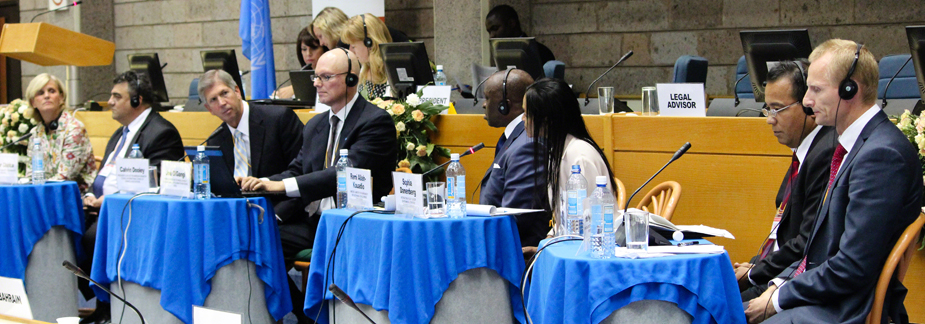|
|

 |
 |
 |
 |
Daily web coverage (click on the following links to see our daily web pages)
|
|
|
|
|
 |
 |
 |
 |
 |
 |
 |
 |
ICCM-3 reconvened on Thursday, 20 September in Nairobi, Kenya. Throughout the day, delegates convened in plenary for the High-Level Dialogue (HLD). This Dialogue gathered a number of high-level speakers from governments, industry, civil society and organizations under the Inter-Organization Programme for the Sound Management of Chemicals (IOMC) to discuss strengthening SAICM for more effective implementation. Key issues emerging from the HLD included: the importance of the QSP, particularly in national chemical profiling to set agendas and priorities; the need to build on best practices and lessons learned for sound chemicals management; the importance of the life-cycle approach and engaging down-stream users; regional, inter-regional and national cooperation for sound chemicals management; and the important role the private sector can play in chemicals management.
The contact group on emerging policy issues met throughout the morning to continue its deliberations on hazardous substances in electrical and electronic products, nanotechnology and manufactured nanomaterials, and endocrine-disrupting chemicals (EDCs). In its report back to plenary, the group said that first reviews of the resolutions on nanotechnology and manufactured nanomaterials, and EDCs, respectively, had been completed, but a number of issues still needed to be resolved. In the afternoon, the contact group on financial and technical resources for implementation resumed its discussions on extending the QSP as well as reviewing the UNEP ED’s proposal on financing for chemicals and wastes. The Conference heard that most delegates had supported the Co-Chairs’ text on the QSP, and that discussions on the ED’s proposal were still ongoing. The Budget Group was scheduled to resume its deliberations in the evening.
Both contact groups, as well as the Budget Group, met late into the night. |
|
 |
 |
 |
 |
 |
 |
 |
 |
 |
High-Level Dialogue panelists L-R: Maria Neira, WHO; Lazar Chirica, Moldova’s Deputy Environment Minister; Calvin Dooley, President and Chief Executive Officer, American Chemistry Council; Joe DiGangi, IPEN; Remi Allah-Kouadio, Côte d’Ivoire’s Minister of Environment and Sustainable Development; Sophia Danenberg, The Boeing Company; Tiarite Kwong, Kiribati’s Minister of Environment, Lands and Agricultural Development; and Per Nylykke, Danish Ministry of Environment.
|
|
 |
 |
 |
 |

 |
 |
 |
 |
ICCM-3 reconvened on Wednesday, 19 September in Nairobi, Kenya. Delegates met in the morning plenary session to hear progress reports from the contact groups on emerging policy issues, and financial and technical resources. The plenary also addressed: implementation of and coherence among international instruments and programmes; information exchange and scientific and technical cooperation; and the health sector strategy. The contact group on financial and technical resources met throughout the day to continue its deliberations in parallel with plenary.
In the afternoon, the contact group on emerging policy issues resumed discussions on hazardous substances in electrical and electronic products and on nanotechnology and manufactured nanomaterials. The plenary session considered the agenda items on cooperation with intergovernmental organizations, and activities of the Secretariat and adoption of the budget.
Delegates’ discussions reflected a general spirit of cooperation, although much work remains to be done to reach agreement on the remaining emerging policy issues and on financial and technical resources. In both the morning and the afternoon’s discussions, delegates expressed concern about future financial arrangements, with many lamenting that the current financial crisis has continued to place a strain on disbursements from donors. A budget group was established to address the draft indicative budget for 2013 – 2015, as well as the activities of the Secretariat.
The budget group as well as the contact groups on emerging policy issues and on financial and technical resources met in the evening, and will report back to plenary on Thursday, 20 September. |
|
 |
 |
 |
 |

 |
 |
 |
 |
Daily web coverage (click on the following links to see our daily web pages)
|
|
|
|
|
 |
 |
 |
 |

 |
 |
 |
 |
Daily web coverage (click on the following links to see our daily web pages)
|
|
|
|
|
 |
 |
 |
 |
 |
 |
 |
 |
ICCM-3 opened on Monday, 17 September, 2012 in Nairobi, Kenya. In the morning, delegates met in an opening session and heard statements by Chirau Ali Makwere, Kenya’s Minister for the Environment and Mineral Resources, and Achim Steiner, UN Environment Programme’s Executive Director (UNEP ED). They also considered organizational matters, and adopted the agenda
In the afternoon, the Conference discussed the evaluation and progress in implementing SAICM, including regional progress reports as well as hearing a report on the 20 indicators of reporting on progress. They further discussed emerging issues such as lead in paint, chemicals in products and hazardous substances in electrical and electronic products and established a contact group for further deliberations on the two issues.
In the evening, ICCM-3 delegates met in a contact group on emerging policy issues. They also attended a reception hosted by the government of Kenya. |
|
 |
 |
 |
 |

 |
 |
 |
 |
Daily web coverage (click on the following links to see our daily web pages)
|
|
|
|
|
 |
 |
 |
 |
|
 |
 |
 |
 |
 E-mail the
Digital Editor
should you have any questions regarding the content of this page
E-mail the
Digital Editor
should you have any questions regarding the content of this page |
 |
 |
 |
 |
|
|
|
|